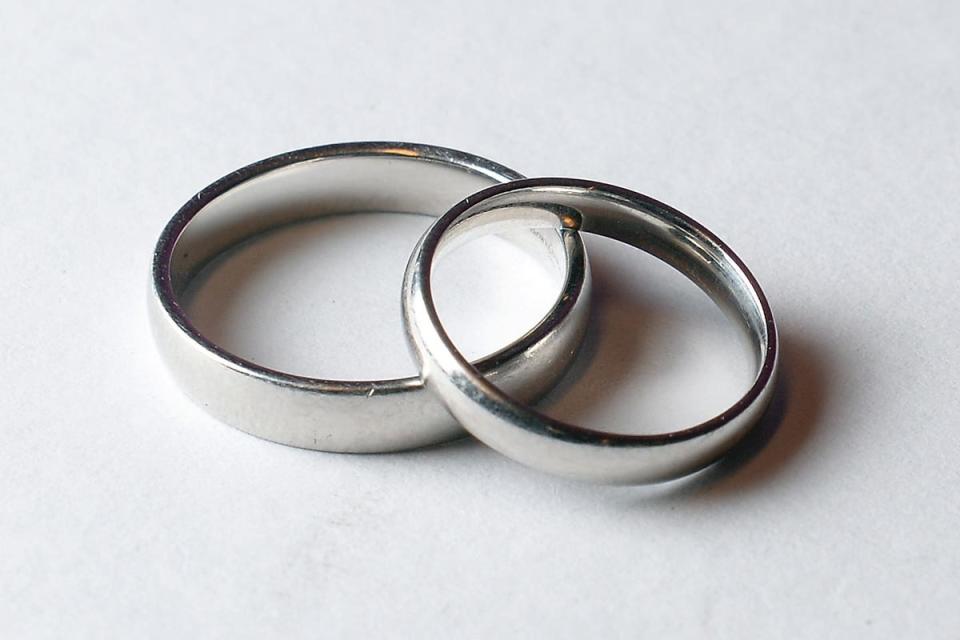Why have we fallen out of love with marriage?

Going to the chapel and we’re… not gonna get married, as it turns out. That’s because, for the first time on record, the percentage of over-16s in England and Wales who are wed or in a civil partnership has fallen below 50 per cent, according to just-released Office for National Statistics (ONS) estimates for 2022. The figure had dropped to 49.4 per cent from 51.2 per cent a decade previously.
It’s the latest stat proving the immutable fact that marriage is on the decline. And not just in the UK – it’s a trend that’s happening in countries all over the world. Almost 90 per cent of the world’s population now live in countries with falling marriage rates; in the US, marriage has decreased by 60 per cent since the 1970s.
Right-wing think tank Civitas has gone so far as to predict that marriage will all but disappear by 2062 after analysing marriage trends over a 50-year period. “One couple will get married for every 400 adults in the UK (0.52 per cent of the population over 16) compared to one couple for every 100 adults today – a drop of more than 70 per cent in two generations,” said the research.
So why is it that we’ve fallen so dramatically out of love with marriage? It’s not that the desire to get hitched has disappeared. Based on a 2023 survey of 906 Generation Z and millennials who are currently in relationships but not married, the Thriving Center of Psychology found that 83 per cent anticipated tying the knot at some point. “It’s still the case that people want to get married, that hasn’t changed greatly, unlike lots of other societal attitudes over the last 30 years,” agrees Paul Dolan, author of Happy Ever After: Escaping the Myth of the Perfect Life and professor of behavioural science at the London School of Economics (LSE). “But there is a general trend for people doing things later.”

That’s certainly true of marriage; the age at which people get married for the first time has consistently been on the rise. In Britain, the median first marriage age for opposite-sex couples in 2020 was 35.3 years for men and 33.2 for women, about five years older than they would have been in 1995, and nine years older than in 1964.
One factor, particularly amid the cost of living crisis, could be cold, hard cash. An annual national wedding survey of 1,800 British newlyweds conducted by Hitched.co.uk found that the average cost of a wedding had increased to £20,700 last year, up from £18,400 in 2022 and £17,300 in 2021. Couples didn’t set out to spend this much – more than half of those surveyed (59 per cent) revealed they had gone over their original budget.
“It’s very difficult to separate out the rising cost of living with the decline in married couples,” says the editor of Hitched.co.uk, Zoe Burke. “As the cost of living rises, couples look to cut spending and a wedding can often feel unjustifiable when you are working to a budget. With the average cost of a wedding rising by 12.5 per cent in the past year to £20,700, it makes sense that for many couples it won’t be a priority to get married. However, with that being said, it is possible to get married on a budget. Registry office weddings have risen in popularity in recent years, as well as the popularity of civil ceremonies, as couples look to pare back their celebrations.”
According to the Thriving Center of Psychology survey, 73 per cent of respondents felt it was too expensive to get married in the current economic climate. However, a higher proportion of those surveyed (85 per cent) “did not feel marriage is necessary to have a fulfilled and committed relationship”. It could simply be that marriage is seen as less necessary for modern couples. “Been together 32 years, not married – if it ain’t broke, don’t fix it,” says Chris Coleman from North Yorkshire. “I definitely don’t see the point, it’s just not for me. Plus, I’m not religious.”
Writer Debbie Rolls has similarly lived with her partner since 1988 with “no intention of ever marrying”. “When we were young we felt our relationship had nothing to do with church or state,” she tells me. “Now it seems a waste of money and time. There was a point where we might have done it for financial reasons but now our teacher pensions are transferable without marriage. Why would we get married?”
Many women have more choice when it comes to marriage than ever before: whether to marry, who, and then whether to stay married
Rachael Lennon, author
The decline in marriage rates is often cast in a negative light, particularly among conservatives with a small “c”. “Societies throughout history have encouraged marriage because they know it’s the most effective method for bonding men with the mothers of their future children,” said Harry Benson, research director of Marriage Foundation, a charity “championing marriage for the good of society”, in response to the latest ONS stats. “The continued trend away from marriage is bad news for couples and bad news for children. Nearly half of all teenagers do not live with both natural parents, most of which due to the separation of parents who never married. Marriage may not be a panacea but it stacks the odds in favour of stable families.”
However, marriage equalling a more stable upbringing for children isn’t something we should accept as fact, argues Dolan. “People will often talk about how divorce is awful for children,” he says. “But you need to know what the counterfactual would be – how would those children fare if the parents had stayed together? Quite often in high-conflict marriages, it’s arguably better for the kids that they do divorce.”
One positive contributing factor is the fact that women have more independence and agency in 2024 than they’ve ever had historically. “Generations of women in the past found that their only means of accessing sex and parenthood, a household and opportunities to contribute to society was as a married woman,” says Rachael Lennon, author of Wedded Wife: A Feminist History of Marriage. “Jane Austen’s Charlotte Lucas [in Pride and Prejudice] preferred the idea of marriage to Mr Collins than the alternative of unmarried life – [being] dependent on her parents at home. A woman’s entire identity and status were routinely transformed at her wedding.
“It’s great that so many women feel freer from the pressures to marry that their predecessors experienced. Many women have more choice when it comes to marriage than ever before; whether to marry, who, and then whether to stay married.”
This sentiment is echoed in a piece of global research documenting the lives and marriages of women, conducted by Dinah Hannaford, associate professor of anthropology at the University of Houston and co-editor of the book Opting Out: Women Messing with Marriage around the World. It identified various reasons why more and more women are choosing not to get married: increasing career opportunities and independence, finding more security living with their parents and siblings, and partners’ infidelity.

“Marriage has mostly not been a great situation for women historically and across the world, and they’re trying to find alternative solutions,” Hannaford wrote. “As new opportunities open up for women to be full people without it, they’re opting for that.”
Hannaford and her team found that, in many of the societies they studied, when women had the option of staying with their own family rather than moving in with a husband, they preferred the former. They also highlighted the value of friendship: “Anthropologists are so focused on lineage and marriage, we don’t think about how friendship plays a really important role in everyone’s lives,” Hannaford wrote.
This is something that Dolan agrees is paramount to our overall wellbeing. “If there was one question I could ask that wasn’t directly related to happiness, but was a good guide to how your life was going, it would be: ‘Have you got someone you can talk to?’ Close relationships are fundamental to the human condition and help us flourish. But they don’t need to be monogamous or intimate. Friendships are critical; marriage is an add-on.”
Perhaps for this reason, men benefit more from being married than women do, according to Dolan’s research. “Lots of men are not very equipped to deal with the absence of a partner, while women are generally better at cultivating networks of friendships and relationships,” he says. “He’s the one losing out by not getting married more than she is – so why do we judge unmarried women more?”
Maybe women are finally waking up to the fact it’s not always in their interests to get married
Paul Dolan, author
In fact, while married men are generally healthier and happier than their unmarried counterparts, data analysis in Dolan’s book found that women who are single with no children live longer and often claim to be happier than those who are hitched. “Maybe women are finally waking up to the fact it’s not always in their interests to get married,” he tells me. “Maybe the power of the narrative that they need to do it is getting less potent.”
Rather than tying ourselves in knots worrying about why people aren’t tying the knot, maybe we should all be prioritising friendships and social networks that will stand us in good stead, no matter our marital status. “We don’t want to throw the baby out with the bathwater when it comes to marriage,” says Dolan. “But marriage can sometimes be a proxy for close relationships. If you want to be happy, focus on working out what good, healthy relationships look like, and how to cultivate them.”
While it doesn’t look like the institution of marriage is going anywhere anytime soon – it’s existed in some form or another in almost every society in recorded history – we “need to keep questioning the assumptions and expectations that have come down to us – and to continue to let go of bad habits”, argues Lennon. “Nearly 90 per cent of women in the UK continue to give up their name following their wedding. Why should women be disproportionately pressured to change their names? Why shouldn’t we expect women’s voices to be heard in wedding speeches as much as men’s? In different-sex weddings, do women really need to be ‘given away’ while their husbands-to-be remain qualified to give themselves?”
And, the million-dollar question: “Can we let go of outdated ideas of what it means to be a woman and a wife and see a fairer distribution of social and domestic labour in our society?” Lennon asks. “We still have some way to go. Marriage needs to keep evolving to survive.”


